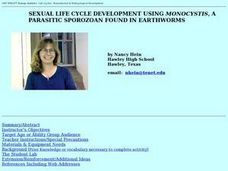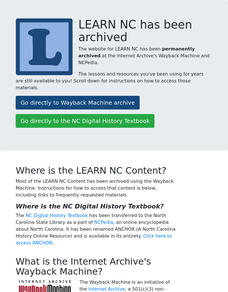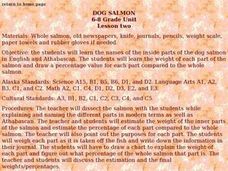Curated OER
Look at Those Seeds Grow!
Students explore plant science by participating in a botany activity. In this seed growth lesson, students identify the necessary elements to ensure a plant grows well and prepare seeds for planting. Students plant their soaked seeds in...
Curated OER
Trout In The Classroom
Young scholars have trout in their classroom and complete journaling, checklists, temperature checking, and ammonia level recording. In this trout lesson plan, take weekly observation records of their trout.
Curated OER
Sanctuary: Quail Island Banks
Students explore visual arts by examining a diorama in class. In this geography lesson, students examine an island off the coast of New Zealand and identify the physical attributes of the land. Students answer study questions regarding...
Curated OER
Temperature and Brine Shrimp Eggs
Students determine the optimal temperature at which brine shrimp eggs hatch and develop. They evaluate the changes, if any, which occur in a brine shrimp culture at various temperatures.
Curated OER
My Favorite Meal
Students investigate ecological systems and the multiple uses of the environment by studying the osprey population.
Curated OER
SEXUAL LIFE CYCLE DEVELOPMENT USING MONOCYSTIS
Students perform a lab to becoe familar with scientific concepts. The skill of inquiry is essential and this lesson furthers its development. The intelligence of kinesthetics is used as learners perform the many aspects of this lab...
Curated OER
Barnacles: Harder than Cement
Fourth graders watch the movements of the complex animal hidden inside the tiny barnacle shells. This lesson allows students to study the behavior, adaptation, and larval stage of the barnacle.
Curated OER
Does a change in pH affect the growth and survival rate of aquatic plants?
Students determine if changes in pH affect the growth and survival rates of aquatic plants. They evaluate the optimal pH levels for the growth of aquatic plants.
Curated OER
pH Change and Brine Shrimp eggs
High schoolers determine if brine shrimp eggs hatch and develop more readily in an environment which has an acid or a basic pH. They evaluate the pH level which is optimal for the hatching and development of brine
shrimp.
Curated OER
DOES A FLUCTUATION IN TEMPERATURE IFFECT THE GROWTH AND SURVIVAL RATE OF AQUATIC PLANTS?
Students determine if different temperatures effect the growth and survival rates of aquatic plants and evaluate the optimal temperature for the growth of aquatic plants.
Curated OER
Flower Power: Kansas Quarter Reverse
Students examine the Kansas quarter reverse and explore the basic needs and life processes of plants. They take a nature walk around the school and draw living and non-living things. In the classroom the sort the specimens collected into...
Curated OER
Water Quality and the St. Mary¿¿¿s River Project Monitoring
Students list different parameters of water and explain how each is important to the balance of the St. Mary ecosystem. They identify the different instruments and explain what they test.
Curated OER
Toy Tally One
Fifth graders explore simple machines. They examine toys and discover toys that are actually simple machines. Students share information, with the class, about their selected toy and how it works.
Curated OER
Laws of Reflection
Students experiment with mirrors to explore the Laws of Reflection. In this experimental lesson students develop their own experiments and follow a list of assigned steps then report what happens in their activity.
Curated OER
Natural Selection
Students model natural selection by using various utensils to "capture food" using a simulated species called "Woolybooger's."
Curated OER
Water Molds (Oomycetes)
Students research a group of fungus-like organisms; the Oomycetes, by baiting them from natural sources (water and soil) and observing them.
Curated OER
The Moon
Third graders identify the phases of the moon. They use the internet to see the different phases of the moon on different dates. They form their own opinions from the information they have read and justify their opinions to their...
Curated OER
Dog Salmon Lesson Two
Students identify the inside parts of a dog salmon in English and Athabascan. They weigh each part of the salmon and determine the percentage of the whole that the part represents.
Curated OER
Determination of Overall Water Quality Using a Quantitative Macroinvertebrate Survey
High schoolers examine water samples from a local stream. They identify various types of macroinvertebrates found in that water ecosystem and perform a quantitative macroinvertebrate survey to determine the stream's water quality.
Curated OER
Land Use Issues
Students discover seeds are a source of life. They also label the parts of a seed and examine the conditions which are needed for the seed to start growing. They follow the life cycle of seeds.
Curated OER
What Repair Proteins are Expressed in C-Ferns After Exposure to Varying Amounts of UV Radiation?
Learners examine the life cycle of c-ferns. They complete experiments on the organisms exposing them to differnet amount of UV radiation. They collect data and analyze their results.
Curated OER
Windows on Life
Pupils explore and observe living development using live fertilized chicken eggs. They open the eggs approximately 72 hrs after fertilization and make observations for several days.
Curated OER
Name Game
Student select a name card from the envelope and class will then sound out the name of the child on the card. They then will spell out the child's name chanting "Give me an A...", "Give me an N...", etc. The teacher then says, "What does...
Other popular searches
- Dissecting a Squid
- Dissecting a Flower
- Dissecting Owl Pellets
- Dissecting a Deer Heart
- Dissecting a Grasshopper
- Dissecting Flowering Plants
- Dissecting Flowers
- Dissecting Clams
- Dissecting a Mushroom
- Dissecting Plant Organs
- Dissecting Sheep Hearts
- Dissecting Tulips

























